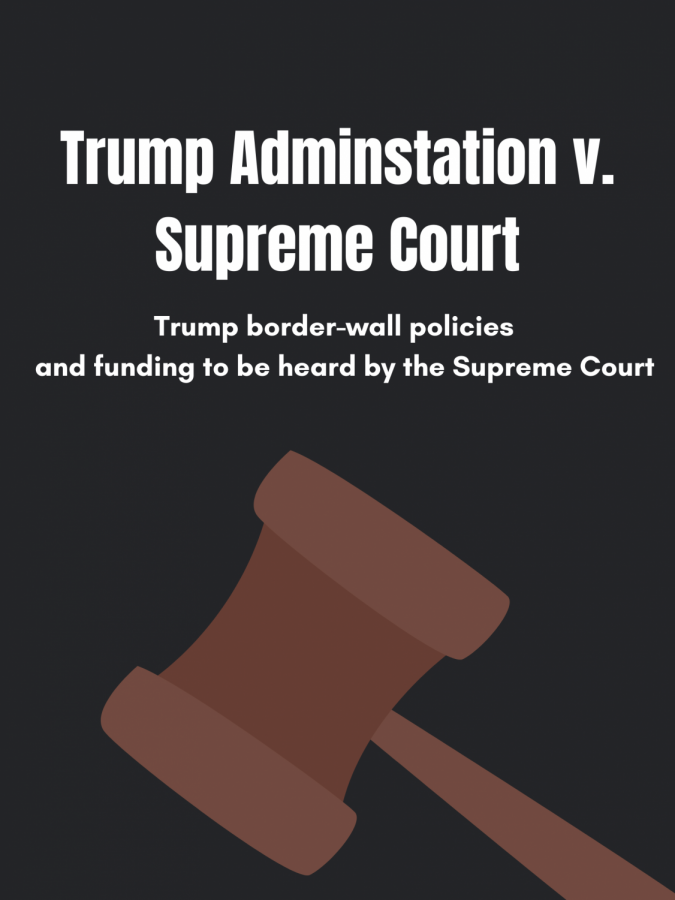Supreme Court Agrees to hear cases over Trump’s Immigration Policies
The Supreme Court is set to hear two of Trump’s immigration cases that will decide whether for not there will be funding for the construction of wall, and if migrants seeking asylum need to remain in their home country until they face trial.
Oct 23, 2020
The Supreme Court has agreed to hear two cases relating to President Trump’s immigration policies; one of those policies addressed the notorious wall he vowed to erect, and the other covered his proposed immigration plans. While the cases are not set to be tried until 2021 due to the court’s full schedule and upcoming elections, it is vital to understand Trump’s position on these matters. If he happens to be reelected, the President may attempt to follow through with his promises, although they seem to have been forgotten by the media since the last election.
The first policy President Trump is being tried on is his plan of building a wall on the southern border of the U.S. Trump v. Sierra Club challenges Trump’s decision to redirect disputed funds appropriated from military needs to the completion of the wall at the southern border. In 2018, Trump’s dispute with Congress over funding for the border wall led to the allocation of about 1.4 billion dollars from lawmakers towards the building of the physical border. This sum of money did not meet the White House’s original request of about six billion dollars, so in response, the President decided to reallocate a large sum of money that was supposed to be used for the Department of Defense and the military into construction.
This decision on the President’s part caused a great deal of tension in the White House since many officials believed that this act was illegal without congressional approval.
This case is a lawsuit against the Trump Administration and an attempt to remove funding from the border wall. Sierra Club, an extremely influential environmental organization in the U.S., is arguing that Trump lacked the authority and congressional approval to use the money towards the building of a wall. Sierra Club also argues that the building of the wall would harm the environment and communities surrounding its location.
This case was already tried in a federal district court in 2019, where the transfer was blocked, but the Supreme Court recently allowed the Trump administration to move forward with the construction using the money from the Department of Defense.
The Sierra Club, along with multiple states opposed to the construction of the wall, rechallenged the case due to their strong opposition to the using of military funds towards the wall construction. If Sierra Club wins, then the Trump administration would not be able to use the military funds to build the wall. The funds would be directed back to the Department of Defense and the Trump Administration would be forced to resort to asking Congress for more money to continue the construction.
“I think that Trump’s immigration policies during his presidency have been blatantly racist. The whole idea that the U.S. needs to build a wall to keep out immigrants in search of more opportunities and a better life is horrible, especially when this country was founded by immigrants,” senior Isabella Rodriguez said.
The second policy President Trump is being tried for is his Migrant Protection Protocols Policy, more commonly referred to as the “Return to Mexico” policy. The policy basically states that any asylum seekers that travel from Mexico to the U.S. need to stay in Mexico for the duration of their immigrant proceeding.
Asylum seekers and nonprofit immigration organizations argue that sending immigrants back to dangerous parts of their home country, where they can face persecution and torture, violates immigration law. Over 60,000 migrants have been returned to Mexico since the 2019 enforcement of the policy. A statement made by the White House regarding the policy explains that the argument against the protocol undermines the President’s ability to address the “crisis” at the southern border.
With the upcoming elections, it is important to stay updated on candidates’ policies and ideas. The empty seat on the Supreme Court and the recent hearing for Amy Coney Barret as a nominee also play an important factor in what policies will be enforced during the next presidential term. While the Supreme Court will not come to a decision on these proceedings until most likely the middle of 2021, citizens should still know what issues are being addressed.












